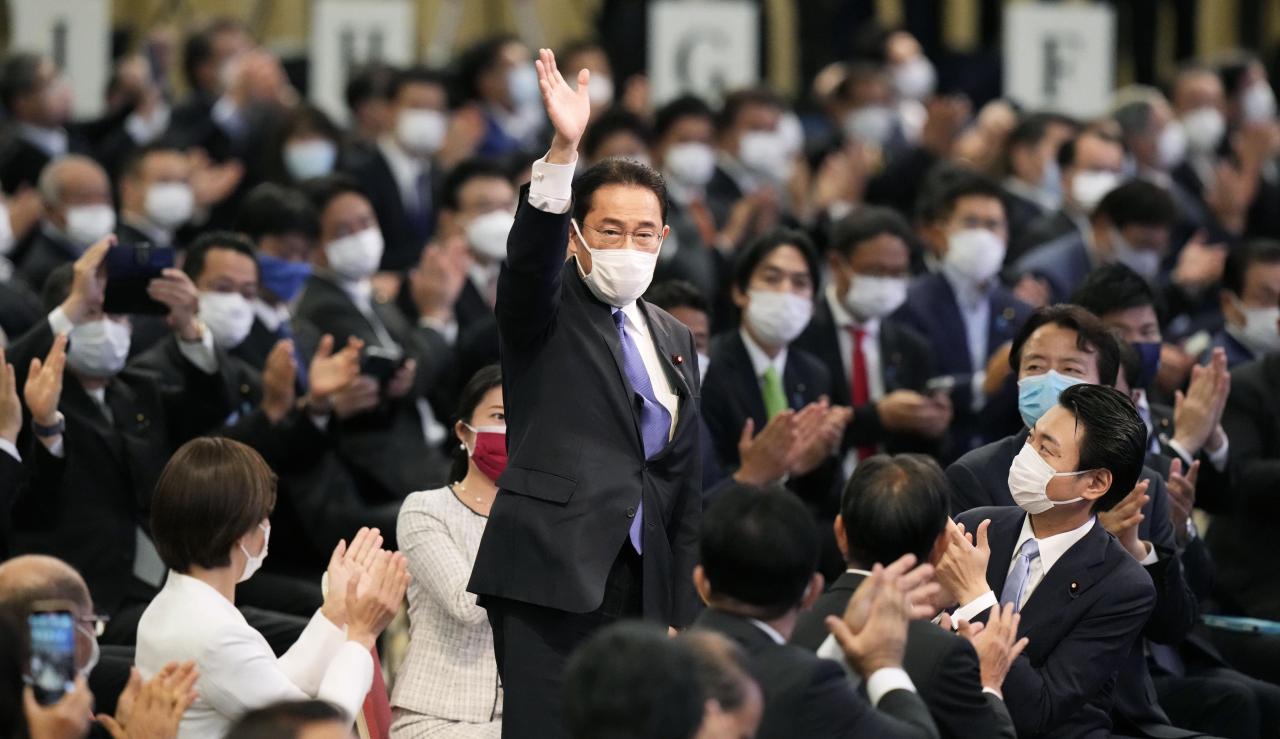Kishida to be Japan's next PM
New leadership in Japan unlikely to trigger huge shift in strained Seoul-Tokyo ties
By Ahn Sung-miPublished : Sept. 29, 2021 - 18:20

Former Foreign Minister Fumio Kishida won the ruling Liberal Democratic Party leadership election on Wednesday, making him all but certain to become Japan’s new prime minister.
The 64-year-old replaces outgoing party leader Prime Minister Yoshihide Suga, who decided early this month to step down after a year in office amid plummeting approval ratings over his handling of the COVID-19 pandemic.
Kishida is effectively assured to be named the prime minister at an extraordinary parliamentary session Monday, given the LDP’s majority in the National Diet, Japan’s legislature.
In one of the most tightly contested leadership elections in years, Kishida, who is popular among lawmakers, beat Taro Kono, the minister overseeing Japan’s COVID-19 vaccination and the public’s favorite, 257 to 170, in a runoff vote.
In the initial round, Kishida won 256 votes, while Kono trailed at 255. Two female candidates, Sanae Takichi and Seiko Noda came in third and fourth, respectively.
It was Kishida’s second run for the LDP’s leadership, after losing out in 2020 to Suga.
Kishida was regarded as a safe bet for the LDP, as the election result showed that the party favored continuity over change. He garnered more support from party heavyweights than Kono, who is popular among the party’s rank-and-file members and has a reputation as an outspoken reformist and political maverick.
A nine-term lawmaker from Hiroshima, Kishida is head of an LDP faction known for its dovish stance. Regarded as a moderate liberal, he was also a close aide to Shinzo Abe, serving as his foreign minister from 2012 to 2017.
During his tenure, Kishida led efforts to realize a historic 2016 visit by then-US President Barack Obama to Hiroshima, one of two cities targeted by an atomic bomb. He is also known in South Korea for striking a controversial 2015 agreement with Seoul to resolve “finally and irreversibly” the issue of “comfort women,” a euphemism for women who worked in the Japanese military’s wartime brothels.
As the new leader of the world’s third-largest economy, Kishida faces a series of tough challenges, including recovering the pandemic-battered economy and countering increasingly assertive China in the region.
Kishida’s tenure also arrives at a time when rancorous diplomatic tensions between Seoul and Tokyo over wartime history and trade see no signs of abating.
Analysts here are pessimistic on a dramatic shift in strained ties between the neighbors under Kishida, as he will likely adhere to his predecessor Suga and Abe’s hawkish policy on Seoul.
“There will likely be no drastic change in Seoul-Tokyo ties under Kishida,” said Lee Won-deog, a professor of Japanese studies at Kookmin University. “Kishida, as Abe’s foreign minister of more than four years and who clinched the 2015 deal, will likely continue Abe and Suga’s stance on Korea.”
Lee added that Japan has no political initiative at the moment, as it has to take care of the upcoming general election and other items on the domestic agenda, to make a first move to improve ties with Seoul.
“The new leader will unlikely risk going against the public sentiment to patch ties with Seoul. Ultimately, it’s up to Seoul to move first to come up with a changed stance on its key issues,” he said, referring to wartime sexual slavery and forced labor, historical issues which have been at the center of the bilateral feud.
He added that the changes will be less likely during the current Moon government, but could be possible when Seoul picks a new president in March next year.
Choi Eun-mi, a Japan expert at the Asan Institute for Policy Studies, echoed a similar stance that breaking the impasse appears difficult in the near future.
She said Kishida’s victory is a testament that the LDP wasn’t ready for a generational change to the younger, newer powers within the party. “Thus, the LDP’s hard-line stance on Seoul will likely continue. With Abe aiding Kishida’s win, the party will likely be unable to move out of Abe’s shadow.”
Immediately after the news, Seoul said it would continue to cooperate with the new Japanese government to develop bilateral relations between South Korea and Japan in a future-oriented manner, according to a Cheong Wa Dae official.
Seoul-Tokyo ties have deteriorated further under Suga since he took office last September after his predecessor Abe resigned due to health problems.
During Suga’s tenure, Korean President Moon Jae-in has been seeking to mend ties with Tokyo. But no significant progress has been made as the neighbors still remain miles apart on key historical matters, including compensation for wartime forced laborers and sexual slavery victims, coupled with Tokyo’s recent decision to discharge radioactive wastewater from the stricken Fukushima nuclear plant into the sea.
Japan continues to insist that all wartime issues were settled under a 1965 treaty that normalized bilateral relations. It also asserts that the 2015 agreement on “comfort women” resolved the matter of sexual slavery.
But many in Korea believe Japan has not taken adequate responsibility for its colonial atrocities. As a result, victims, while demanding a sincere apology from Japan, have also sought justice in court.
In 2018, Korea’s Supreme Court ruled that Japanese firms must compensate the Korean victims who were forced to work in their factories during World War II. In apparent retaliation, Japan in 2019 slapped export controls on chemicals vital to the Korean semiconductor industry, and hasn’t entirely lifted them.
With a Seoul court moving to seize assets held by a Japanese company here so that compensation can be provided to plaintiffs, there are fears that the already fragile relations between the two countries could worsen.



![[Exclusive] Korean military set to ban iPhones over 'security' concerns](http://res.heraldm.com/phpwas/restmb_idxmake.php?idx=644&simg=/content/image/2024/04/23/20240423050599_0.jpg&u=20240423183955)

![[Graphic News] 77% of young Koreans still financially dependent](http://res.heraldm.com/phpwas/restmb_idxmake.php?idx=644&simg=/content/image/2024/04/22/20240422050762_0.gif&u=)



![[Pressure points] Leggings in public: Fashion statement or social faux pas?](http://res.heraldm.com/phpwas/restmb_idxmake.php?idx=644&simg=/content/image/2024/04/23/20240423050669_0.jpg&u=)










